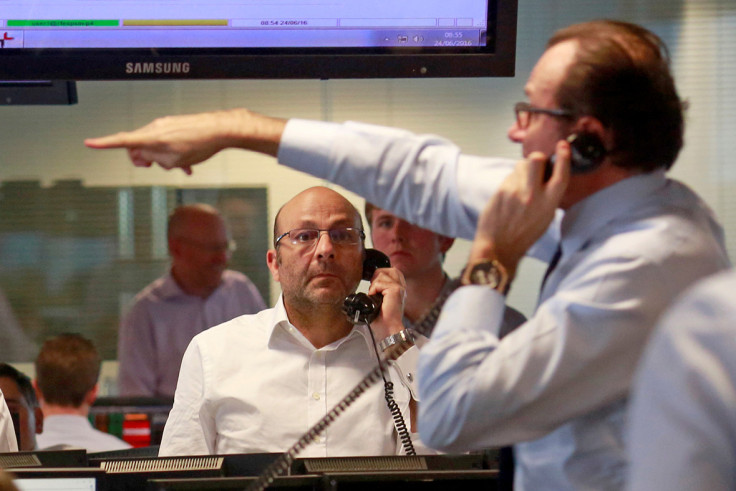Brexit aftermath not a 'Lehman Brothers collapse' moment
Banks, housebuilders and airline shares tumbled in the post-Brexit sell-off as London indices slipped sharply.

The London market is going through some turbulent times but the situation is not akin to the slump seen after the Lehman Brothers collapse in 2008 which triggered global financial turmoil, according to market commentators.
Banks, housebuilders and airline shares tumbled in the post-Brexit sell-off on Monday (27 June) as London indices slipped sharply, triggering circuit breakers that brought a temporary halt to proceedings.
At 3:54pm BST, the FTSE 100 was down 1.92% or 117.85 points at 6,020.84, while the more domestically focussed FTSE 250 fell 6.19% or 995.78 points at 15,092.27.
Housebuilders Barratt Developments (-20.58%), Persimmon (-19.21%), Travis Perkins (-18.27%) and Taylor Wimpey (-17.12%) saw substantial declines, but the biggest faller of the session was budget airline EasyJet down 23.46%.
Away from equities, the pound slipped 3.7% intraday to a 31-year low versus the dollar, changing hands at $1.3151, before recovering to $1.3211.
In a statement before the markets opened, Chancellor George Osborne acknowledged there would need to be an "adjustment" in the UK economy. On the process of the UK's departure from the EU, he added that only the UK can trigger Article 50.
"In my judgement, we should only do that when there is a clear view about what new arrangements we are seeking with our European neighbours," he said, adding that the UK economy was resilient enough to endure short-term volatility.
Meanwhile, former Bank of England governor Lord Mervyn King joined a growing chorus of market commentators who believe that the Brexit influenced market volatility was nowhere near the global financial turmoil witnessed following the collapse of US investment bank Lehman Brothers on 15 September, 2008.
In an interview with the BBC, King said: "What we need is a bit of calm now, there's no reason for any of us to panic. Markets move up, markets move down. We don't yet know where they will find their level and the whole aspect of volatility is that there is a trial and error process going on before markets discover what the right level of stock markets and exchange rates actually are."
Kit Juckes, head of foreign exchange at Societe Generale, also said Brexit is a not a 'Lehman moment' that will trigger an unforeseen chain of events. "Policymakers and companies have had time to make contingency plans, even if they can't fully offset the impact."
"Uncertainty is bad for UK growth and won't help Europe either. That wouldn't matter if the global economy were ticking along nicely but it isn't. We expect the pound to fall another 10% over time, and the euro may fall by about half that much," Juckes added.
However, money managers continue to advise investing in UK stocks, deemed attractive owing to a lower pound and two successive days of decline following the Brexit vote. Noland Carter, chief investment officer at Heartwood Investment Management, said investors should explore opportunities in UK property shares.
"UK listed property developers have fallen by as much as 30% this week and this plus the sharp fall in the pound could stimulate international investor flows into this market."
A bit of perspective was also required, said Julian Jessop, economist at Capital Economics. "It would be wrong to conclude that the world is on the cusp of another global financial crisis. The focus on the magnitudes of the one-day declines obscures the fact that equities had rallied strongly ahead of the UK referendum result in anticipation of a vote to remain in the EU.
"Friday's collapse in the FTSE 100 simply reversed that move, leaving equities little changed over the week."
Elsewhere, the swaps market is now pricing in a 15% chance of UK interest rates turning negative over the course of the next year following a vote in favour of Brexit. The market also giving a 50% chance of an interest rate cut in July, a 65% chance of a cut by August, and an 80% chance of a cut by the end of the year.
The 10-year gilt yield fell below 1% for the first time to 0.933%, before recovering slightly, as investors sought the safety of government bonds in the face of Brexit uncertainty.
Laith Khalaf, senior analyst at Hargreaves Lansdown, said, "The Brexit vote has substantially moved the dial on interest rate expectations, with markets now pricing in a significant chance of rates going negative in the UK.
"This is good news for borrowers, who can now expect lower mortgage rates for even longer, but cash savers will be wondering just how many years they have to wait to get a decent return on their deposits. The Bank of England may soon find itself between a rock and a hard place, if the economy and inflation start pointing in different policy directions."
© Copyright IBTimes 2025. All rights reserved.



















